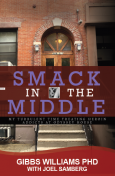
LitPick Review
WATCH THE LITPICK ANIMATED REVIEW VIDEO
In Smack in the Middle: My Turbulent Time Treating Heroin Addicts at Odyssey House, psychoanalyst Dr. Gibbs Williams recounts his 17 months working as an assistant director at New York’s infamous Odyssey House, a facility that treated recovering heroin addicts in the late 1960s. Led by founder Dr. Judianne Densen-Gerber, Odyssey House employed some controversial techniques to keep its residents clean and put them on a solid path to recovery. While at first excited about his new position, these techniques, philosophies, and morale of the staff and residents quickly begin to wear down Dr. Williams.
By then, he has become so invested in the cause and so emotionally enslaved by Dr. Densen-Gerber that the job takes on its own form of addiction that becomes tough to break. Suffering from his own past traumas, a desire to fulfill a meaningful purpose in the world, and a determination to make this dream job work for him adds fuel to this emotional fire, which eventually spirals out of control. Like any addiction, there comes a time when enough is enough. For Dr. Williams, that realization forces him to choose between jumping ship or going down with it.
Opinion:
The average memoir about addiction is usually told from the perspective of the addict. So, Dr. Williams’ account of what it’s like to be on the other side of the treatment is a refreshing point of view that delves into the politics behind rehab facilities, the mind games that staff are forced to play with their patients, and the abuse of power that can come from treating this particular type of illness without proper outside supervision.
Readers looking for Dr. Williams’ anecdotes about particular patients that he treated are going to find very little focus on that aspect of his time at Odyssey House. Instead, he lays out the moral conundrums he faced in doing what he thought was right versus Dr. Judi’s enforced philosophies on addiction.
Dr. Judi’s methods were contradictory, physically and emotionally draining, manipulative, and at times, even abusive. According to the author’s account, she fought fire with fire, commanding trust and respect and then weaponizing them on both her patients and staff.
Dr. Williams is the Nick Carraway to Dr. Judi’s Jay Gatsby. She assumes near total control over him until he breaks enough to escape her clutches. But the influence remains even years later through his candid, straightforward storytelling.
His writing is professional but simple. It isn’t weighed down with technical jargon, though he does go on extra-long tangents about his emotional state in trying to make sense of his time at Odyssey House, feeling more like a resident than a staff member.
Even after all he goes through, Dr. Williams still puts both Dr. Judi and Odyssey House on a pedestal. Whether or not he should is up to the reader to decide. I recommend this book to avid nonfiction readers who want to learn about a different side of addiction from a writer who has made it his life’s work to battle it while, in his own way, falling victim to it.


